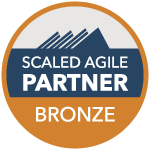SAFe DevOps Practitioner with SDP Certification
SAFe® DevOps course provides you a comprehensive overview for understanding the DevOps competencies needed to accelerate time-to-market by improving the flow of value through the Continuous Delivery Pipeline. Attending the class prepares you to take the exam and become a certified SAFe DevOps Practitioner (SDP).
A SAFe 6 Certified DevOps Practitioner (SDP) is a SAFe professional responsible for improving the complete flow of value through a Continuous Delivery Pipeline from idea to operational solution. Key areas of responsibility include participating in Continuous Exploration, Continuous Integration, Continuous Deployment, Release-on-Demand, continuous testing, continuous security, and building a culture of shared responsibility.
Optimizing Your Value Stream with the Scaled Agile Framework SAFe, version 6
The course will build an understanding of the complete flow of value from Continuous Exploration to Continuous Integration, Continuous Deployment, and Release on Demand. Attendees will explore SAFe’s CALMR (Culture, Automation, Lean, Measure, Recover) approach to DevOps, which helps create a culture of shared responsibility for the full spectrum of Solution delivery. It helps align people, processes, and technology throughout the organization to achieve faster time-to-market.
Attendees will leave with the tools they need to execute an implementation plan for improving their delivery pipeline, and the knowledge they need to support the plan.
Attendees may be eligible to apply for 15 PDUs toward their continuing education requirements with the Project Management Institute (PMI) for PMP and PMI-ACP certifications.
SAFe® and Scaled Agile Framework® are registered marks of Scaled Agile, Inc.
Osallistumismuoto
Classroom
Remote
Duration
2 days
Price
1195 €
Certificate
Kyllä
Target Group
This SAFe DevOps training course is targeted to following professionals:
- All members of an Agile Release Train
- Development Managers, Engineering Managers
- Configuration Managers, Release Managers
- Development Leads, Developers, UI/UX Developers
- Infrastructure Architects, System Architects
- Product Managers, Product Owners
- System Administrators, DBAs, InfoSec
- QA Managers, Testers
- Release Train Engineers, Scrum Masters
Goal
- understand the CALMR approach to DevOps, why it is so important, and be able to explain it to others
- understand the importance of continuous integration, continuous testing, and be ready to apply it
- apply the concepts of continuous security
- map your current delivery pipeline
- measure the flow of value through the delivery pipeline
- identify gaps and delays in flow
- improve the process of exploring customer needs
- improve the process of developing, building, and integrating continuously
- improve the process of continuously deploying to staging and production environments
- improve the release process
- execute an action plan for their DevOps transformation
Benefits of the SAFe DevOps training
You’ll learn to
- describe what DevOps is and why it is important
- build a culture of shared responsibility across the value stream
- continuously explore user needs
- describe architectural considerations for continuous delivery
- build and integrate the system continuously
- improve the quality of the system with continuous testing
- deploy systems to staging and production environments continuously
- release systems to customers and manage recovery as necessary
- maintain security by inspecting continuously for vulnerabilities
- measure the flow through the Continuous Delivery Pipeline
- support a SAFe DevOps transformation in the enterprise
Prerequisites
All are welcome to attend the course, regardless of experience.
However, the following prerequisites are highly recommended for those who intend to take the certification exam: 5+ years experience in software development, testing, business analysis, product or project management and experience in Scrum
Contents of SAFe DevOps Practitioner with SDP Certification
- Introducing DevOps
- Mapping your Continuous Delivery Pipeline
- Gaining alignment with Continuous Exploration
- Building quality with Continuous Integration
- Reducing time-to-market with Continuous Deployment
- Delivering Business Value with Release on Demand
- Taking action
SAFe DevOps Practitioner exam
- Attendees must attend both days of the course in order to be eligible for the exam.
- This training prepares you for SAFe 6 DevOps Practitioner Exam
- You take the exam using your own computer any time within 30 days of the training, only internet access is needed.
- Exam cost: First exam attempt is included as part of the course registration fee if the exam is taken within 30 days of course completion.
- Exam Format: Multiple Choice
- Exam Delivery: Web-based; closed book, no outside assistance, timed
- Exam Access: Candidates can access the exam within the SAFe Community Platform upon completion of the SAFe 6 Devops Practitioner course
- Exam Duration: Once the exam begins, candidates have 90 minutes (1.5 hours) to complete the exam
- Number of Questions: 45
- Passing Score: 33 out of 45 (73% passing score)
- see SAFe 5 DevOps Practitioner sample test questions
Attendees who pass the SAFe DevOps Practitioner exam will receive:
- A SAFe DevOps Practitioner certificate
- A SAFe 6 DevOps Practitioner digital badge to promote your accomplishment online
- A one-year certified membership as a SAFe Agilist, which includes access to the SDP Community of Practice
- Access to a variety of learning resources to support certified professionals during their SAFe journey.
Training material
The training material is in English. The training is run by using official material provided by Scaled Agile, Inc.
Schedule
Course days begin at 9:00 and end at 16:30, breakfast available from 8:15 a.m forwards
Trainer
This training is provided with Olingo.

You might be interested in these courses:
Blogs related to the subject

